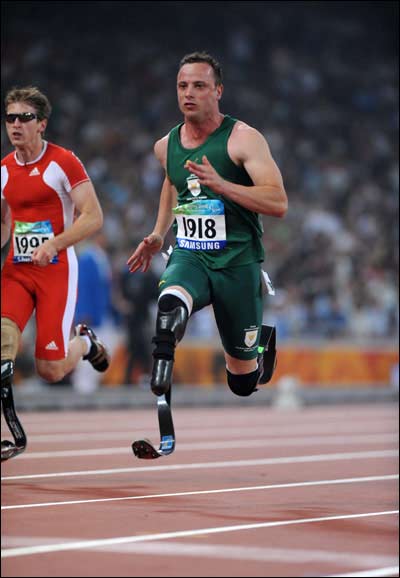|
|
Oscar Pistorius: Athlete, Activist, Fastest Man on No Legs
Known to many as the "Blade Runner," Oscar Pistorius is a 21-year-old sprinter from South Africa who has captured the world's attention with his head-to-head battle with the International Association of Athletics Federations (IAAF) for the right to compete against able-bodied athletes in the Olympic Games. When he was 11 months old, Pistorius, who was born with a congenital disorder, underwent an operation that amputated the bottom portion of both of his legs. As a child, he took part in various sports, such as rugby, water polo and tennis. Then, he turned his eyes to the Athletics track. This is where he shined. After a lot of training on his Cheetahs, he grabbed gold (in the 200m) and bronze (in the 100m) at the Athens 2004 Paralympic Games. Since then, he has taken down world records for his disability class in the 100m, 200m and 400m dashes. He has also proved that he can hold his own in competitions against able-bodied runners, performing well in the South African Championships, the Golden Gala in Rome and the Norwich Union British Grand Prix. As his time got faster and faster, he set his goal on competing in the Beijing 2008 Olympic Games. His most trying hurdle, it turned out, wasn't his running speed. It was the IAAF.
 "Blade Runner" Oscar Pistorius competes at the Bird's Nest. Photo: [Xinhua] In 2007, the IAAF passed a regulation prohibiting technological aids on the competitive field, stating that springs, wheels or other such devices gave athletes with a disability an unfair advantage over athletes competing with their natural legs. Pistorius disagreed vehemently. He appealed the decision, arguing that his carbon-fiber Cheetahs had disadvantages, too. On a wet track, the blades had less traction, and even not-so-heavy winds could blow them out of sync. Overall, he stated that his "legs" allowed him the capability of running just like able-bodied athletes, not worse than, but also not better than them. The Court of Arbitration for Sport agreed. In May 2008, the arbitration body made a ruling that overturned the IAAF regulation, specifically in Pistorius's case. He was given the green light to compete in the Olympic Games. If he qualified, that is. Although the South African Olympic Committee delayed finalizing their Olympic delegation to allow Pistorius a chance to qualify, the sprinter fell short of the 45.95-second Olympic qualifying mark for the 400m. His personal best time of 46.25s, achieved in Lucerne on July 16, was still not fast enough to get him on the start list for the 4 X 400m Relay team for South Africa. Had he made the squad, he would have gone down in history as the first leg amputee to compete in a running event in the Olympic Games. Pistorius is not discouraged, believing every bit in his credo, "You're not disabled by the disabilities you have, you are able by the abilities you have." Instead, he looks forward to being able to compete in the next Olympic Games. With four more years of training ahead, Pistorius is confident that he will qualify for London. For now, his mind is set on a triple sweep in the Beijing Paralympic Games. Pistorius will, barring any unforeseen circumstances, run in the 100m final on September 9, the 200m final on September 13 and the 400m final on September 16. "My goal here is to win three gold medals and hopefully, break a world record," he said. Pistorius's fans do not believe it will be a problem for the fastest man on no legs. (BOCOG September 9, 2008) Related Stories
|
| Copyright © China Internet Information Center. All Rights Reserved E-mail: webmaster@chinagate.com.cn Tel: 86-10-88828000 |